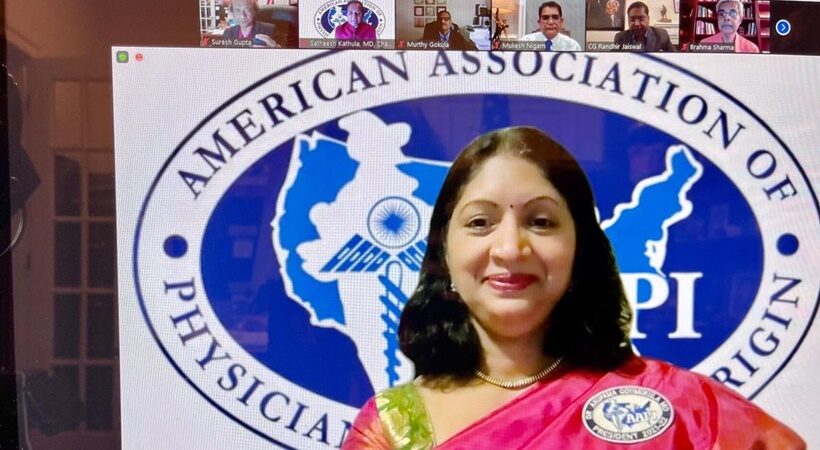The American Association of Physicians of Indian Origin (AAPI) launched Adopt-A-Village project, a rural health initiative in India, at a virtual event. The event held on August 27, which was chaired by Dr Satheesh Kathula, with Dr Anupama Gotimukula, Dr Jagan Ailinani, and Dr Ram Singh, has been attended by Indian Ambassador Taranjit Singh Sandhu and joined by Consul Generals of Chicago, New York, Houston, Atlanta and San Francisco.
AAPI represents the interests of more than 80,000 practising physicians in the United States and over 40,000 medical students, residents, and fellows of Indian origin.
Dr Anupama Gotimukula, President, AAPI, in her welcome address, said: “A lot of efforts is being put into this initiative, Adopt-a-Village Project where AAPI in collaboration with Global TeleClinics (GTC), Inc. plans to adopt 75 villages in honour of 75 years of India’s independence.”
“As India celebrates her 75th anniversary Independence Day celebrations, AAPI has planned to adopt 75 villages in India spread across the states of Andhra Pradesh, Gujarat, Karnataka, Tamil Nadu and Telangana, where the rural people of India will be offered free health screenings in 75 rural villages for various common diseases including anaemia, high cholesterol, malnutrition, kidney problems, obesity and hypoxemia. Results analyzed by GTC and further action recommended by their team of experts will also be, followed up. This is a small contribution from AAPI to Mother India in celebration of Azadi Ka Amrut Mahotsav.”
Dr Anupama has also thanked the AAPI members for their generous support for the work of AAPI and for sponsoring their ancestral villages and going back to their roots.

While Dr Satheesh Kathula, Chairman of AAPI’s Adopt-A-Village program, reminded that India has nearly 700,000 villages. Three out of four Indians, and about 77 per cent of the poor, live in villages. The majority of the population has no access to safe drinking water and sanitation. The needs in these rural areas are unlimited, and the scope of work are endless.
“By adopting one village at a time and working with the government and NGOs, NRIs can make a difference,” he said.
Dr Ravi Kolli, President-Elect of AAPI, said, “While India has made substantial progress in health care as evidenced by the fact that life expectancy in India at birth now is 71 years as opposed to 58 years in 1990 and 41 years in 1960, there are significant gaps and divergence in health metrics in different regions in India. India thus needs to redouble and continue its efforts and dedicate resources to tackle these perennial challenges. The post-graduate training of physicians specializing in family medicine in every teaching institution will create a motivated and well-trained family physicians to address these deficits and deliver accessible, affordable, economical and continuous preventive and primary care to rural as well urban poor populations to raise health outcomes substantially all across India,” he said.
“An individual can make a tremendous difference in the lives of many in India by adopting a village,” said Dr Jagan Ailinani, who was instrumental in founding this noble program and set an example by adopting his birth village in the state of Telangana.
Dr Ram Singh said: “NRIs can adopt the village they hail from originally and make a significant contribution towards its development. There is a real will and desire on the part of governments, both at the state and the center to work with NRIs and NGOs to bring development to rural India.”
Urging the diaspora community to come forward to honour India by joining in the year-long celebrations, Ambassador Sandhu, in his message, said, “As India is entering 75th year of independence, honouring men and women, who fought for the freedom, we rededicate ourselves to build an India where the dreams and aspirations of India’s 13 billion people are realized.”



















